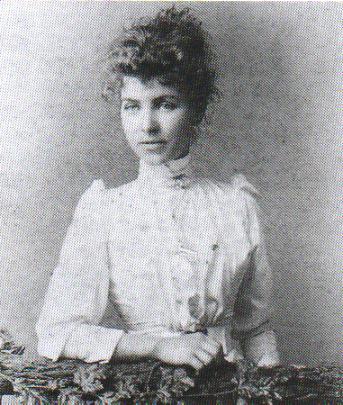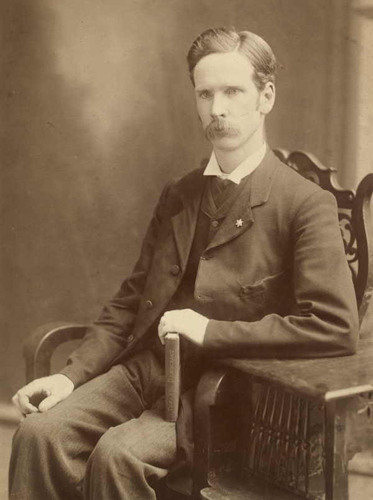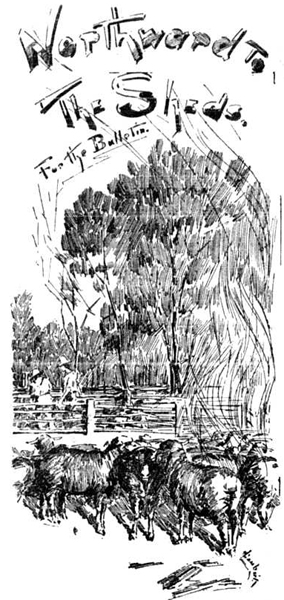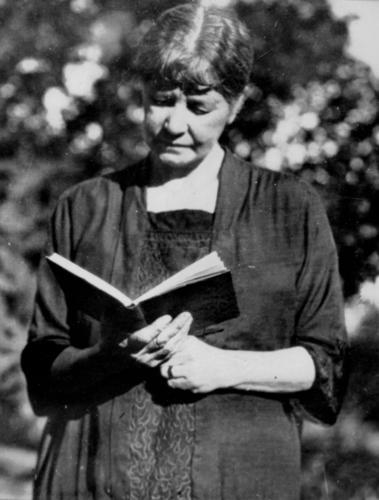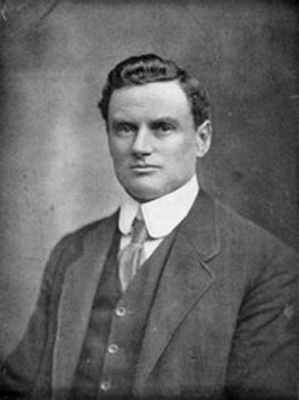Come, Stumpy, old man, we must shift while we can;
All our mates in the paddock are dead.
Let us wave our farewells to Glen Eva's sweet dells
And the hills where your lordship was bred;
Together to roam from our drought-stricken home --
It seems hard that such things have to be,
And it's hard on a "hoss" when he's nought for a boss
But a broken-down squatter like me!
No more shall we muster the river for fats,
Or spell on the Fifteen-mile plain,
Or rip through the scrub by the light of the moon,
Or see the old stockyard again.
Leave the slip-panels down, it won't matter much now,
There are none but the crows left to see,
Perching gaunt in yon pine, as though longing to dine
On a broken-down squatter like me.
When the country was cursed with the drought at its worst,
And the cattle were dying in scores,
Though down on my luck, I kept up my pluck,
Thinking justice might temper the laws.
But the farce has been played, and the Government aid
Ain't extended to squatters, old son;
When my dollars were spent they doubled the rent,
And resumed the best half of the run.
'Twas done without reason, for leaving the season
No squatter could stand such a rub;
For its useless to squat, when the rents are so hot
That one can't save the price of one's grub;
And there's not much to choose 'twixt the banks and the Jews
Once a fellow gets put up a tree;
No odds what I feel, there's no court of appeal
For a broken-down squatter like me.
First published in The Queenslander, 30 June 1894;
and later in
Old Bush Songs: Composed and Sung in the Bushranging, Digging and Overlanding Days edited by A. B. Paterson, 1905;
The North Queensland Register, 25 February 1924;
The Bulletin, 17 January 1951;
From the Ballads to Brennan edited by T. Inglis Moore, 1964;
The Penguin Australian Song Book edited by J.S. Manifold, 1964;
Folk Songs of Australia and the Men and Women Who Sang Them edited by John Meredith and Hugh Anderson, 1967;
The Overlander Songbook edited by Ronald George Edwards, 1971;
Complete Book of Australian Folk Lore edited by Bill Scott, 1976;
Old Bush Songs and Rhymes of Colonial Times edited by Douglas Stewart and Nancy Keesing, 1976; and
The Penguin Book of Australian Ballads edited by Elizabeth Webby and Philip Butterss, 1993.
Author: Charles Augustus Flower (1856-1948) was born in Port Fairy, Victoria and worked as a jackaroo there until moving to South West Queensland. He owned and ran properties in that area until his death in 1948.
Author reference sites: Austlit
All our mates in the paddock are dead.
Let us wave our farewells to Glen Eva's sweet dells
And the hills where your lordship was bred;
Together to roam from our drought-stricken home --
It seems hard that such things have to be,
And it's hard on a "hoss" when he's nought for a boss
But a broken-down squatter like me!
No more shall we muster the river for fats,
Or spell on the Fifteen-mile plain,
Or rip through the scrub by the light of the moon,
Or see the old stockyard again.
Leave the slip-panels down, it won't matter much now,
There are none but the crows left to see,
Perching gaunt in yon pine, as though longing to dine
On a broken-down squatter like me.
When the country was cursed with the drought at its worst,
And the cattle were dying in scores,
Though down on my luck, I kept up my pluck,
Thinking justice might temper the laws.
But the farce has been played, and the Government aid
Ain't extended to squatters, old son;
When my dollars were spent they doubled the rent,
And resumed the best half of the run.
'Twas done without reason, for leaving the season
No squatter could stand such a rub;
For its useless to squat, when the rents are so hot
That one can't save the price of one's grub;
And there's not much to choose 'twixt the banks and the Jews
Once a fellow gets put up a tree;
No odds what I feel, there's no court of appeal
For a broken-down squatter like me.
First published in The Queenslander, 30 June 1894;
and later in
Old Bush Songs: Composed and Sung in the Bushranging, Digging and Overlanding Days edited by A. B. Paterson, 1905;
The North Queensland Register, 25 February 1924;
The Bulletin, 17 January 1951;
From the Ballads to Brennan edited by T. Inglis Moore, 1964;
The Penguin Australian Song Book edited by J.S. Manifold, 1964;
Folk Songs of Australia and the Men and Women Who Sang Them edited by John Meredith and Hugh Anderson, 1967;
The Overlander Songbook edited by Ronald George Edwards, 1971;
Complete Book of Australian Folk Lore edited by Bill Scott, 1976;
Old Bush Songs and Rhymes of Colonial Times edited by Douglas Stewart and Nancy Keesing, 1976; and
The Penguin Book of Australian Ballads edited by Elizabeth Webby and Philip Butterss, 1993.
Author: Charles Augustus Flower (1856-1948) was born in Port Fairy, Victoria and worked as a jackaroo there until moving to South West Queensland. He owned and ran properties in that area until his death in 1948.
Author reference sites: Austlit
